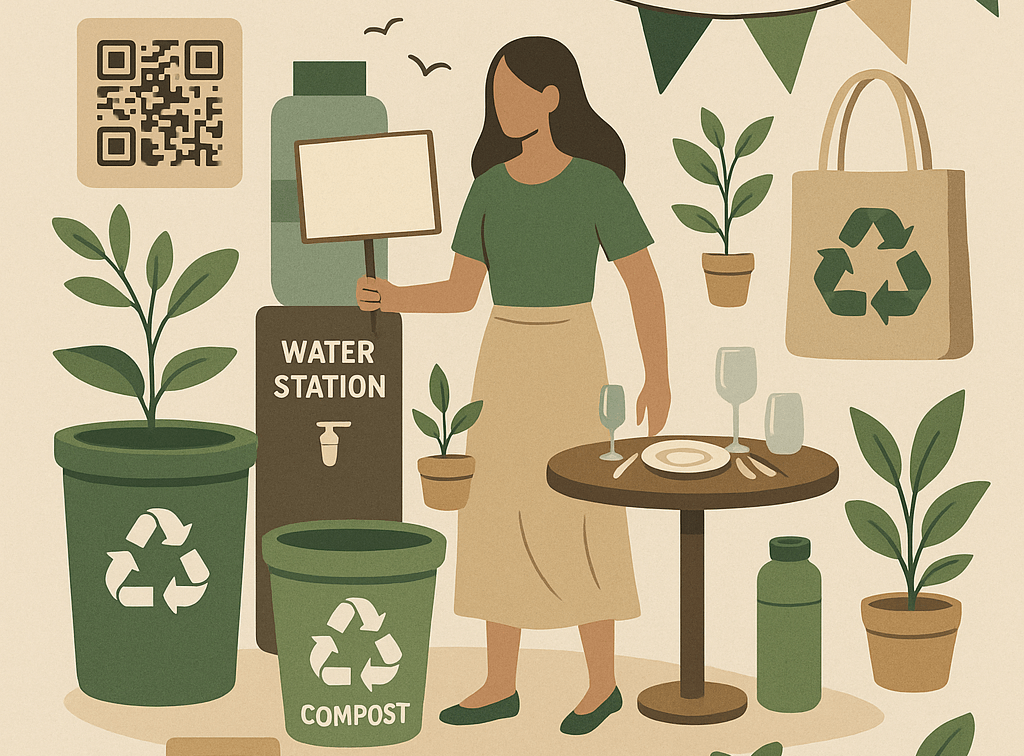Sustainability is becoming an increasingly important value for both event organizers and attendees. Planning an eco-friendly event not only benefits the planet, but it also resonates with guests who appreciate environmentally conscious efforts. Whether you’re organizing a conference, party, fundraiser, or wedding, integrating green practices can significantly reduce your event’s environmental impact without sacrificing quality or experience.
Here are practical and effective ideas for hosting an environmentally responsible event from start to finish.
Choose a Sustainable Venue
The location of your event plays a big role in determining its ecological footprint. Look for venues that:
Use renewable energy sources or energy-efficient systems
Have waste reduction or recycling programs in place
Are easily accessible by public transportation or walking
Offer natural lighting and ventilation to reduce electricity use
If possible, host your event outdoors or in a space that doesn’t require heavy modifications, cutting down on resource use for lighting, decor, and climate control.
Minimize Paper and Printed Materials
Digital tools are an easy way to eliminate unnecessary paper waste. Use:
Event apps or websites for schedules and announcements
Digital tickets and check-ins
QR codes to share programs, menus, or speaker bios
Email or SMS for communication with attendees
If printed materials are absolutely necessary, choose recycled paper and print with soy-based inks. Encourage guests to recycle their materials after the event.
Reduce Transportation Emissions
Travel can account for a significant portion of your event’s carbon footprint. Encourage attendees to travel sustainably by:
Offering virtual participation options for those who cannot travel
Promoting carpools, shuttles, or group transportation
Choosing centrally located venues to reduce driving distance
Partnering with public transit providers for discounted passes
You can also calculate and offset your event’s travel-related emissions by supporting environmental projects or carbon credit programs.
Use Eco-Friendly Decor
Decorations often create unnecessary waste, especially when used for just one event. Consider these sustainable alternatives:
Rent decor items instead of buying disposable pieces
Choose reusable items like cloth banners, fabric tablecloths, and wooden signage
Incorporate natural elements such as potted plants, dried flowers, or stones
Avoid balloons, glitter, and other non-recyclable materials
At the end of the event, donate or repurpose decorations instead of throwing them away.
Focus on Sustainable Catering
Food and beverage services can be optimized for environmental friendliness. Work with caterers who:
Source ingredients locally and seasonally
Offer vegetarian or plant-based options, which have lower carbon footprints
Minimize food waste through accurate head counts and portion control
Serve food using compostable, biodegradable, or reusable dishware
You can also partner with food donation programs to share leftovers with local shelters or food banks.
Eliminate Single-Use Plastics
Plastic waste is one of the most harmful pollutants, and events often generate large amounts of it. Take steps to eliminate single-use plastics by:
Providing water refill stations instead of bottled water
Giving guests branded reusable water bottles or cups
Using compostable utensils, straws, and plates if reusable items aren’t feasible
Avoiding plastic bags, wraps, or individually packaged items
Encourage attendees to bring their own reusable items whenever possible.
Implement Recycling and Composting Stations
Make it easy for guests to dispose of waste responsibly by setting up clearly marked bins for:
Recycling (paper, plastics, metals)
Composting (food scraps, compostable dishware)
Trash (for items that can’t be recycled or composted)
Provide signs with simple illustrations and place staff or volunteers nearby to help guide proper sorting.
Opt for Eco-Friendly Giveaways
Event swag is fun, but often ends up unused or in the trash. Choose giveaways that are both useful and sustainable:
Reusable tote bags, mugs, or notebooks
Seed packets or small potted plants
Digital gift cards or donations to environmental charities in attendees’ names
Local, handmade, or upcycled products
Avoid mass-produced plastic trinkets that will be quickly discarded.
Educate and Involve Your Attendees
Transparency and education go a long way. Let your attendees know what eco-friendly efforts are in place and how they can contribute:
Announce sustainability goals before and during the event
Offer incentives for sustainable behavior (e.g., bring your own cup, win a prize)
Include sustainability as a topic in your programming
Encourage feedback on green practices for future improvement
When guests feel part of the mission, they’re more likely to support it actively.
Work with Sustainable Partners
From vendors to sponsors, every collaborator should align with your event’s eco-conscious values. Seek partners who:
Share environmental commitments or certifications
Use ethical and low-impact materials or production processes
Are local to reduce transportation needs
Collaborating with like-minded businesses creates a stronger, unified message and can even open up opportunities for cross-promotion.
Measure and Share Your Impact
After the event, evaluate your sustainability performance. Metrics to consider:
Amount of waste diverted from landfills
Reduction in paper and plastic use
Carbon emissions offset
Percentage of local or vegetarian catering used
Share this data in a post-event report or email to show transparency and progress. This helps build credibility and encourages others to adopt similar practices.
Wrapping Up with Purpose
Hosting a green event isn’t just a trend—it’s a meaningful way to align your brand or organization with the values of responsibility and innovation. By making environmentally conscious decisions at each step, you not only minimize harm to the planet, but also set an example for your attendees and the broader industry.
Even small changes, when multiplied across multiple aspects of an event, can make a big difference. With creativity and thoughtful planning, an eco-friendly event can be both beautiful and impactful.
